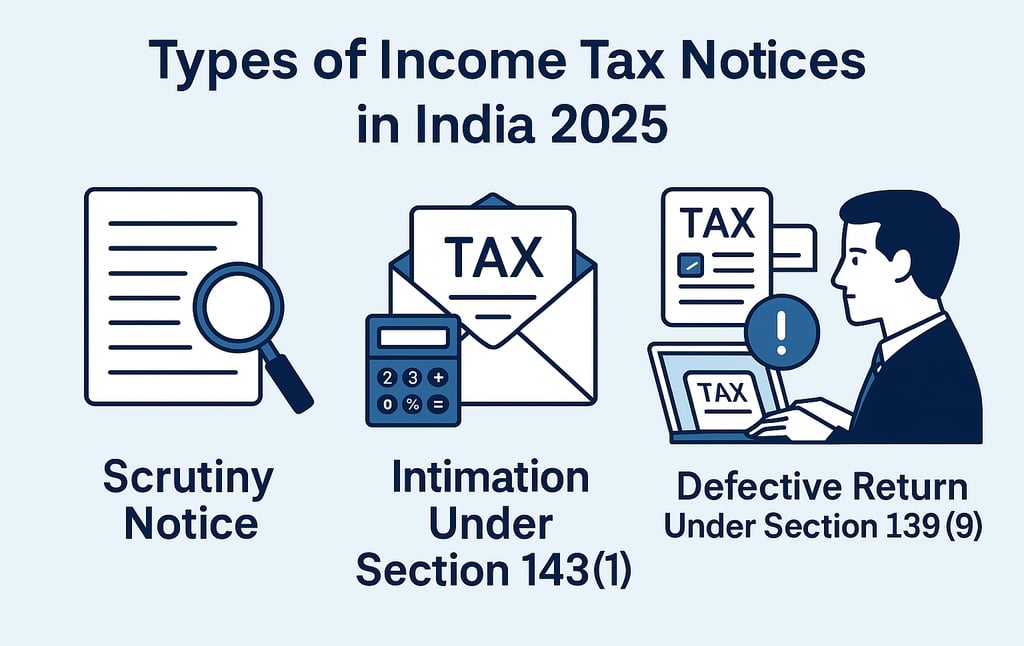Income Tax Notices in India: Types, Reasons & How to Respond (2025 Guide)
4/11/20253 min read


Income Tax Notices in India: Types, Reasons & How to Respond (2025 Guide)
Tax compliance in India has evolved significantly, especially with the digitization of income tax systems and stricter enforcement by the Income Tax Department. Yet, receiving a notice from the department can cause concern for many individuals and businesses. Understanding the types of income tax notices, the reasons behind them, and how to respond correctly can ease the stress and help you stay compliant.
This updated 2025 guide covers everything you need to know about income tax notices in India.
What Is an Income Tax Notice?
An income tax notice is an official communication from the Income Tax Department of India. It is sent to taxpayers when there is a mismatch, delay, discrepancy, or requirement for additional information regarding your income tax return (ITR) or tax payments.
Notices vary depending on the section of the Income Tax Act under which they are issued. Each serves a specific purpose and requires a different response from the taxpayer.
Common Types of Income Tax Notices
1. Notice under Section 139(9): Defective Return
This notice informs the taxpayer that their filed return has errors or omissions. For instance, missing details or incorrect income declaration can lead to this notice.
2. Notice under Section 142(1): Inquiry Before Assessment
The tax department sends this notice when it needs additional documents or clarification before initiating an assessment. It may also ask you to file your ITR if you failed to do so.
3. Notice under Section 143(1): Intimation
This isn’t necessarily alarming. It’s a system-generated intimation summarizing tax calculations as per your filing versus those computed by the department.
4. Notice under Section 143(2): Scrutiny Assessment
This is a detailed scrutiny notice. It means the tax authorities want to closely examine your filed return. You must provide documentation and clarification supporting the income and deductions reported.
5. Notice under Section 148: Income Escaping Assessment
The department issues this when it believes certain income was not reported and has escaped taxation. The taxpayer must then refile the return and justify the omission.
6. Notice under Section 156: Demand Notice
This notice demands payment of due taxes, penalties, or interest. You must pay the mentioned amount within 30 days to avoid further action.
7. Notice under Section 245: Set-Off of Refund
If you have an outstanding tax liability from earlier years, this notice informs you that the department will adjust it against your current year’s refund.
Reasons for Receiving an Income Tax Notice
• Mismatch in Income – When reported income does not align with AIS or Form 26AS data
• High-Value Transactions – Real estate deals, large bank deposits, or stock market activity may trigger scrutiny
• Failure to File Returns – Not filing your ITR despite taxable income
• Incorrect Deductions or Claims – Unsubstantiated deductions under Sections 80C, 80D, etc.
• TDS Mismatch – Discrepancies between TDS claimed and that reported by the deductor
How to Respond to an Income Tax Notice
Read Carefully
Understand the notice section, reason, and due date for a response.
Verify Details
Match the notice details with your records—Form 16, bank statements, investment proofs, and Form 26AS.
Login to e-Filing Portal
Visit www.incometax.gov.in, navigate to ‘e-Proceedings’ or ‘Compliance’ to view and respond.
Provide Clarifications
Upload documents, file revised returns if required, or pay any outstanding amount depending on the notice type.
Consult a Tax Expert
When in doubt, always consult a tax advisor or CA to avoid errors and penalties.
What Happens If You Ignore a Notice?
Ignoring a notice can lead to consequences such as:
Penalty for non-compliance
Interest accumulation on unpaid taxes
Best judgment assessment by the AO
Prosecution in extreme cases
Timely response is crucial.
Final Thoughts
Receiving an income tax notice doesn’t always mean something is wrong. Many are routine communications or requests for clarification. However, understanding your rights and responsibilities ensures smoother compliance and avoids penalties.
With income tax compliance becoming more automated and monitored, staying informed and acting promptly is your best approach in 2025.
Let One Solution help you track your returns, manage notices, and stay financially secure.
Related Blogs
About One Solution
Quick Links
Contact Info
One Solution — Your trusted partner for financial success.
📍 F17, Grand Plaza, Paltan Bazar
Guwahati, Kamrup (M), Assam
India, Pin: 781008
📞 9650072280
© 2025 One Solution. All Rights Reserved.
